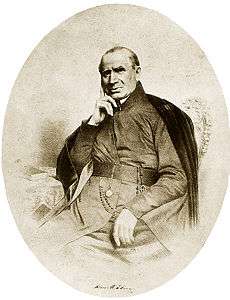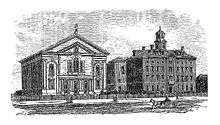John McElroy (Jesuit)
| John McElroy | |
|---|---|
 | |
| Born |
14 May 1782 Enniskillen, Ireland |
| Died |
12 September 1877 (aged 95) Frederick, Maryland, United States of America |
| Resting place | St. John's Cemetery |
| Alma mater | Georgetown College |
| Known for |
Founder of St. John's Literary Institution, First Catholic Army Chaplain (US Army), Founder of Boston College High School, Founder of Boston College |
| Religion | Christian |
John McElroy, S.J. was born in Ireland in 1782, and emigrated to the United States in 1803. McElroy enrolled in Georgetown University in 1806, the same year in which he joined the Society of Jesus as a lay brother. His brother Anthony also became a Jesuit. Fr. McElroy assumed the management of Georgetown's financial affairs. He was also ordained a priest in 1817. In 1822 he was sent to Frederick, Maryland, where he was to remain for 23 years as pastor of St. John the Evangelist Catholic Church in downtown Frederick. It was in Frederick that he founded St. John's Literary Institution. During the Mexican–American War, McElroy served as an Army chaplain, and on his return from Mexico, he went to Boston, where he established Boston College and Boston College High School.
Early years
John McElroy, SJ was born 14 May 1782 in Enniskillen, Ireland.[1] McElroy was the younger of two sons. In the hopes of providing a better life for John and his brother Anthony, their father, a farmer, financed their travel to the United States of America. In 1803 the two young men boarded a ship leaving the port of Londonderry arriving in Baltimore, Maryland on 26 August.[2] McElroy eventually settled in Georgetown, Washington D.C. and became a merchant.[3]
Georgetown
In 1806 McElroy entered Georgetown College in Washington D.C. the same year he entered the novitiate of the Society of Jesus as a lay brother. McElroy eventually managed the finances of Georgetown College[4] and in 1808 erected the tower building.[5] McElroy managed the schools finances so well, that through the period of economic hardship following the War of 1812, he was able to send several Jesuits to Rome to study.[5]
McElroy was ordained in May 1817, after less than two years of preparation.[2] As a new priest, McElroy was assigned to the Holy Trinity Catholic Church in Georgetown, Washington D.C., as an assistant pastor.[6] In his short time at Trinity, he was most responsible for the growth of the congregation and the enlargement of the Church itself.[6] This was achieved by increasing the monthly subscription for congregation members from 12½ cents to $12.50 on 3 July 1819.[6] The following day he travelled to most of the congregation members homes and collected $2000 in pledges. He immediately set to work having the Church modified to include 2 lateral wing chapels, which were first used on 3 October 1819.[6]
On 11 January 1819, John McElroy was granted United States citizenship.[7]
In 1819, McElroy started a Sunday School for black children who were taught prayers and catechisms simultaneously with spelling and reading, by volunteer members of the congregation.[6] McElroy spent his remaining years in Georgetown teaching the lower grades.[8]
Frederick
One of McElroy's first known interactions with the catholic community in Frederick, Maryland was around 1804, when he gave money to Father John Dubois, the pastor in Frederick, Maryland, to be applied to St. John the Evangelist Church.[3]
In 1822, Father John Dubois' successor Father Maleve fell ill. Father McElroy travelled to Frederick to minister to him in illness and was with him when he died on 3 October.[3] A letter was sent by a number of prominent gentlemen from Frederick to the superior of the Jesuits at Whitemarsh, Maryland requesting the services Father McElroy in Frederick.[3] In 1822 Father McElroy was appointed pastor there.
Father McElroy set to work immediately to expand the congregation. In 1823 he began negotiations with the Sisters of Charity in Emmitsburg, Maryland for the establishment of a school for girls in Frederick. In 1824, the St. John's Benevolent Female Free School was founded by the Sisters of Charity of Saint Joseph at 200 East Second Street in Frederick.[3] In 1825, Father McElroy set to work replacing the structure that housed the school, a pre-American Revolution log cabin, with a modern building large enough to also house an orphanage. The money raised for construction was primarily accomplished due to support of the orphanage.[3]
McElroy's next task was to found an educational institution for boys. On 7 August 1828, the construction of St John's Literary Institute began. The following year the construction was completed and the school was opened,[9] a school which is currently operating under the name of Saint John's Catholic Prep.
In 1833 McElroy worked with John Tehan, a well-known local architect, to create a plan for a new church.[3] St. John the Evangelist Roman Catholic Church was consecrated on 26 April 1837, the first Roman Catholic Church consecrated in what was then the United States.[10] When the Church was completed it was the largest parish Church in the United States of America.[11]
Mexican War
Shortly after the Mexican-American War began in 1846, many Irish Catholic immigrants joined the U.S forces in Mexico.[12] The religious needs of these soldiers were not being met. In a discussion between the President of the United States of America, James K. Polk and Archbishop John Hughes of New York, it was decided that for the first time, Roman Catholic priests would join US Army forces as chaplains.[12] Father McElroy and Father Anthony Rey were selected by the Archbishop and were sent to Mexico and joined General Zachary Taylor's army in Matamoros on 5 July 1846.[8]
McElroy, then 64, stayed at the base camp in Matamoros, tending to the casualties, saying Mass and hearing confessions.[12] In May 1847, McElroy was withdrawn from Mexico due to continuous illnesses.[13] Father Rey died for his efforts at the hand of guerrillas.[6]
Boston
In October 1847 Father McElroy was sent to Boston, Massachusetts by the Bishop of Boston, John Bernard Fitzpatrick, to serve as pastor of St. Mary's parish in the North End.[8] Bishop Fitzpatrick set McElroy to work on bringing a college to Boston.[14]

In 1853 McElroy found a property in the South End where the city jail once stood. After 2 years of negotiations the project fell through due to zoning issues.[8]
A new site was identified and city officials endorsed the sale. Two important gifts were received, a bequest of $3000 from Joseph Coolidge Shaw, and $5000 plus all construction expenses from Catholic philanthropist Andrew Carney.[8] In 1858, Bishop Fitzpatrick and Father McElroy broke ground for Boston College, and The Church of the Immaculate Conception. Classes began in the fall of 1864, and would continue at this location until 1913 when the college moved to its current location at Chestnut Hill.[8]
Initially Boston College offered a 7-year program including both high school and college. This joint program continued until 1927 when the high school was separately incorporated.
Memorials
Memorial Buildings
- McElroy Commons (Boston College) – dedicated on 9 November 1961.[15]
- McElroy Hall (Boston College High School) – opened in 1950.[16]
- McElroy Hall (Saint Katharine Drexel Church) – Frederick, Maryland.
Memorial Awards
- The John McElroy Award – Inaugurated in 1992, a plaque is awarded annually to individuals whose actions or achievements have advanced Catholic school education in Frederick, Maryland. The plaque is a bas relief created by artist William M. Cochran.[17]
- Father John McElroy Founder's Award – an award given by Saint John's Catholic Prep to a student who best exemplifies the school's Jesuit roots, as indicated by St. John's former president Robert A. Pastoor.[18]
Retirement & Death
In 1868 McElroy retired to the Jesuit novitiate in Frederick, Maryland. In 1872 he visited Georgetown for his final time to celebrate his golden jubilee. Father McElroy's eyesight was failing and while moving through his home he fell, fracturing his femur, which would eventually lead to his death.[19] Father John McElroy died 12 September 1877 at the Jesuit Novitiate in Frederick, Maryland.[20] For some years leading up to his death, McElroy was regarded the oldest priest in the United States and the oldest Jesuit in the world.[8] He was buried in the Novitate Cemetery. In 1903 the Jesuits withdrew from Frederick and the graves were moved from the Frederick Jesuit Novitiate Cemetery (1805–1904) to St. John's Cemetery.[21]
References
- ↑ "St. John's Cemetery", St. John the Evangelist Roman Catholic Church. Frederick, Maryland
- 1 2 O'Kane, John. A popular history of the Catholic church in the United States, pgs. 385–386. D. & J. Sadlier & Co, New York.
- 1 2 3 4 5 6 7 Williams and McKinsey (1910).History of Frederick County, Maryland, Volume 1, p. 381,446–447,510–511. Genealogical Publishing Company, Baltimore. ISBN 9780806380124.
- ↑ "Rev. John McElroy, SJ", Georgetown University Libraries Special Collections, Retrieved 19 May 2012.
- 1 2 McLaughlin, James Fairfax. College Days at Georgetown, p. 169. J.B. Lippincott Company, Philadelphia. ISBN 1273297407.
- 1 2 3 4 5 6 Warner, William. At Peace with All Their Neighbors: Catholics and Catholicism in the National Capital, 1787–1860, pgs 113–117, 118. Georgetown University Press, Washington D.C.
- ↑ Tepper, Michael. New World Immigrants, A consolidation of ship passenger lists and associated data from periodical literature, p 258. Clearfield Company, Baltimore
- 1 2 3 4 5 6 7 O'Tool James (Summer 2007). The old man, A life in the fray prepared John McElroy for the start-up of Boston College, Boston College Magazine.
- ↑ Shea, John Gilmary. Memorial of the first century of Georgetown College, D.C., p 81. P.F. Collier, New York
- ↑ Stern, Nicolas C. "175 years strong: St. John’s celebrates anniversary of consecration with service” The Frederick News Post, Frederick, 28 April 2012.
- ↑ "About Us=St Johns-Frederick Website". . Retrieved 19 May 2012.
- 1 2 3 O'Conner, Thomas H. "Breaking the religious barrier", The Boston Globe, Boston, 10 May 2004.
- ↑ O'Connor, Thomas.McElroy in Mexico, Boston College Magazine.
- ↑ "Jesuit History at BC", Boston College Retrieved 23 May 2012.
- ↑ Ekenstierna, Denise. "The Name Behind The Building, McElroy Commons", The Heights, Boston, 14 November 2009.
- ↑ "History=Boston College High School Website". . Retrieved 24 May 2012.
- ↑ "Awards=Friends of Catholic Education Website". . Retrieved 25 October 2012.
- ↑ Rigaux, Pam. "Moving on to bigger and better things" The Frederick News Post, Frederick, 23 May 2009.
- ↑ Shea, John Gilmary. Memorial of the first century of Georgetown College, D.C., p 267. P.F. Collier, New York
- ↑ . Sadliers' catholic directory, almanac and clergy list quarterly, p. 51. D. & J. Sadlier & Co, New York.
- ↑ "St. John's Cemetery=St John the Evangelist Church". . Retrieved 22 May 2012.
External links
- Guide to Enniskillen and County Fermanagh
- Georgetown University
- St. John of the Evangelist Church
- Boston College
- Boston College High School